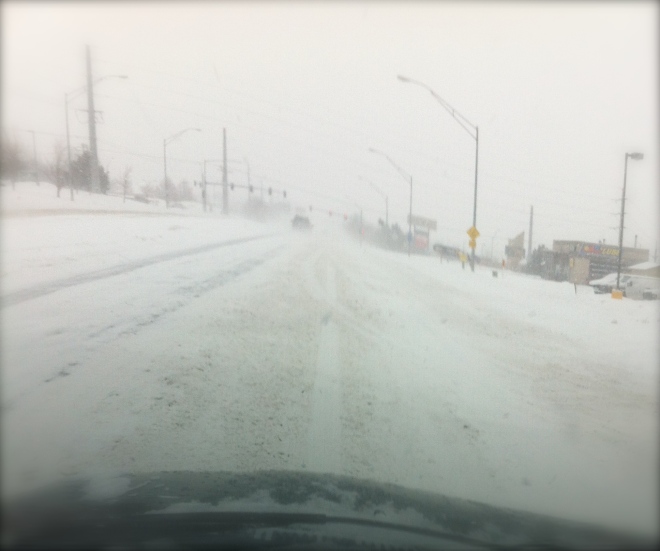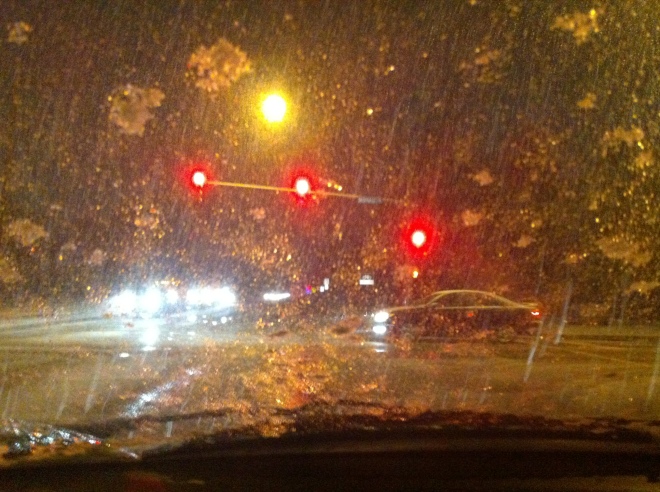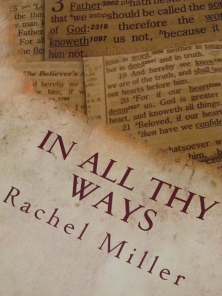Part 2 of 2
As I clutched the steering wheel, straining to see into that storm, I wasn’t really thinking much about the spiritual benefits of the situation. I was thinking about getting down that mountain alive! Whiteouts, however, provide some good lessons for those moments when our path is obscured. Here are just a few:
1. Follow the leader.
Have you ever navigated a storm by following taillights? It’s frightening. What if the taillights disappear in the snow? What if the other driver stops abruptly, and you run into the back of him? What if he turns and you miss it? At that point, the tension level in the car is directly related to how much you trust the other driver.
When our path is obscured by the constant storm of activity and responsibilities around us, it’s easy to start gripping the wheel, pumping the brakes, and squinting into the fog in an effort to get ourselves through it. But, we’re putting out needless effort. We have a steady light to follow—one we can trust implicitly.
If we’re following God, we have no need to worry. He will guide us past the dangers along the edge of the road and lead us through any sudden turns. We can trust Him because, as Job said, “…He knoweth the way that I take: when He hath tried me, I shall come forth as gold.” (Job 23:10) God is the One who set the path in front of us in the first place. He knows where it is leading. It may lead through storms and fires, but as a result we will come out as purified gold—a treasure in God’s hand.
This fact, however, does us no good if we don’t acknowledge Him. We can say, “Yep, God knows where I’m headed,” and at the same time be plowing our way blindly through the storm because we’re not willing to follow His lead. We act on our own instincts because we’re not willing to trust the taillights in front of us.
Proverbs 3:5-7 says, “Trust in the Lord with all thine heart; and lean not unto thine own understanding. In all thy ways, acknowledge him, and he shall direct thy paths. Be not wise in thine own eyes: fear the Lord, and depart from evil.” We have to let it all go: Give up our understanding of things, commit our works to God, and allow Him to establish our thoughts (Proverbs 16:3). When we let go of the things we’re holding onto then we can take hold of His hand, and let Him lead us through the storm.
2. Don’t get off the path.
I knew that icy road was lined with steep drop-offs—whether I could see them or not. I wouldn’t have had to worry about my car spinning out of control and going over the edge if I had pulled over, gotten out of my car, and attempted to walk down the highway. But, more likely than not I would have blindly stumbled over the edge. I might have been struck by another vehicle. Chances are I would have wandered off the road and gotten lost. Who knows how long it would have taken me to get back to the road or to be found once the storm cleared. People die that way.
Sometimes God puts curves in our path. Sometimes they are sharp and sudden. But, unless He is telling us to make a turn, switching directions in a storm can be dangerous. We panic when we can’t see the road, and we start looking for a new, safer path. All the while God is saying, “Let thine eyes look right on, and let thine eyelids look straight before thee. Ponder the path of thy feet, and let all thy ways be established. Turn not to the right hand, nor to the left: remove thy foot from evil.” Instinct tells us to find shelter, but we often forget that God is our shelter in the time of storm. (Ps 61:3)
Once we’re off the path, we’re headed in the wrong direction. That icy highway was still leading to Great Falls, neither the destination nor the road itself had changed. They had simply been obscured. The same is true in life. Don’t leave the path just because you can’t see it; you’ll be headed the wrong way. Keep going in the direction God has given you.
If we’re listening, we’ll know when God is leading us into something different. He promised in Psalm 32:8, “I will instruct thee and teach thee in the way which thou shalt go: I will guide thee with mine eye.” What a precious promise in a storm that blocks the path from our view! He doesn’t leave us to blunder about, He asks us to trust His direction—to keep following the taillights. In Isaiah 30:21 God said, “And thine ears shall hear a word behind thee, saying, This is the way, walk ye in it, when ye turn to the right hand, and when ye turn to the left.” When it’s time to turn, God will let you know; until then stay on the path.
3. Slow down.
As the rear end of my car tried to overtake the front end, I knew immediately what I needed to do. It makes so much sense when we’re driving. You can’t see anything, you don’t know what’s coming or what’s around you, your car is about to do a 360, so—slow down.
Somehow in life we get it all mixed up. The storms come, the responsibilities, the constant pressure and activities, so what’s our solution? We try to do it faster. We add more things in, thinking they will eventually lighten the rest of the load. We rush things. We rush people. We become distant, distracted, irritable, and impossible to be around. All because we’re trying to barrel our way down a path we cannot see in hopes of getting through the storm sooner.
I don’t remember Jesus rushing around very often. His day was filled with busyness, still the only time the word “haste” is ever linked to Him is when He was telling Zacchaeus to get out of the tree. I don’t remember Jesus running everywhere like a crazy man trying to pack all He could into those 3 ½ years. But, I do remember Him walking from one place to the next, teaching and healing as he went. I remember Him slowing down at the end of a long day to spend time with his Father in prayer.
God did not intended for us to heap massive weights upon ourselves and carry them alone into the storm. Nor did He intend for us to rush through the storm. God wants us to slow down, but we must learn how.
Had I slammed on my brakes as I was coming down that mountainside, I would have spun out. In my mind, I can still see the exact trajectory the car would have taken. I had to first lift and steer. Then I could ease into the brakes.
Slowing down on icy roads takes practice, fortunately, as Christians, we have a good Teacher. God longs to spend time with us. Just as the bridegroom in Song of Solomon sought to be with His bride, God knocks at our door in the still moments of the day. He waits there and whispers, “Come unto me, all ye that labour and are heavy laden, and I will give you rest. Take my yoke upon you, and learn of me; for I am meek and lowly of heart: and ye shall find rest unto your souls. For my yoke is easy and my burden is light.” Matthew 11:28-30
The question is “Are any quiet moments left?” Do we fill them all up, so we have no time remaining for Him? The rest we long for is found in those moments of learning from Him. The desire to rush through the storm diminishes as we take His hand and find comfort in Him. But, if we rush through the day and lock the door of our heart as we slip beneath the covers, then, like the bride, we may finally drag ourselves from our beds to answer his knocking, only to discover that He has withdrawn himself. (SOS 5:1-6)
4. Stop.
This is where I find myself.
That day on the highway, the storm never got so bad that I couldn’t keep creeping along. By the time I reached the bottom of that horrid sheet of ice, I had nearly driven out of the worst of it. But, sometimes, the storm comes against you so hard that you have no other choice. You have to stop.
We each go through different kinds of storms: Storms of sickness, of financial pressures, of job difficulties, of relationship problems, of time pressures, of loss. Sometimes more than one storm strikes at once. We’re tempted to do all the wrong things to navigate the fury around us. We start spinning like a whirling dervish (or a car on ice), trying to manage everything…It doesn’t have to be that way.
Sometimes we just need to stop.
We may compare our lives to someone else and say, “I have no excuse. If they can do that, then I can handle this.” It’s good to be encouraged by what others are doing, unless in attempting to do likewise we take our eyes off of our Leader.
It doesn’t matter if your storm is no more than a sprinkle and a breeze—if it has distracted you from Christ and made it impossible for you to clearly see the path He has laid out before you: Stop. Find a quiet place. Step away from the storm. The place of greatest peace is in His presence. Wait on Him. Let Him take all the elements of the storm, whatever they may be, and say, “Peace be still.”
Does this mean we disengage from life? No. The disciples’ ship didn’t stop sailing because they left their posts and went to Jesus, but it would have sunk if they hadn’t gone to him. The few moments they took to seek help from the Savior was the step that eventually saved them and the ship.
Stopping is a choice. Occasionally, God stops us. He says, “Okay, if you’re not going to stop yourself then I’m going to help.” Usually, the circumstances are not too pleasant. Most of the time, however, stopping is up to us. God doesn’t force us to pull away from the mayhem around us. He waits. He drops hints and clues. The Holy Spirit prompts us that we have lost sight of things and need to step back, but He doesn’t usually force us to stop. He wants us to choose to seek Him.
Some of God’s greatest works were done while His people were standing still. (Check out Exodus 14:13.) Ruth’s redemption came as she sat still. (Ruth 3:18) We try to force our way through the storm, thinking once we’re on the other side we’ll be able to figure everything out. It rarely occurs to us in those moments that perhaps God wants us to quietly sort through things with Him, so once the fog lifts we’ll already be headed in the right direction.
I’ve recently taken time to slow down. To reflect on where things are and where God is leading. But, I can clearly see I also need to take time to stop. Sometimes, stopping has to be orchestrated, and I’ve begun looking for places in my “score” where I can put a several measure rest. I don’t know exactly how or when or where, but I’m looking forward to those extra moments with the Lord!
How about you? Where are you right now? Do you just need to keep following the taillights? Have you gotten off the path? Is it time to slow down?
Where is your favorite place to spend time alone with the Lord? I’d love to hear about it!
~~~~~~~~~~~~~~~~~~
ABOUT RACHEL MILLER
I am the author of three books, including the In All Thy Ways Devotional Journal. You can check them all out here. I also run a Christian editing and writing service. Check it out and let me know how I can help you.


